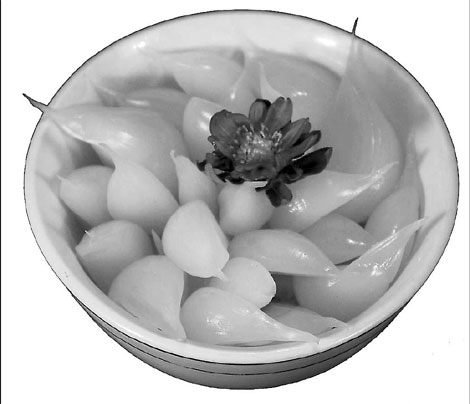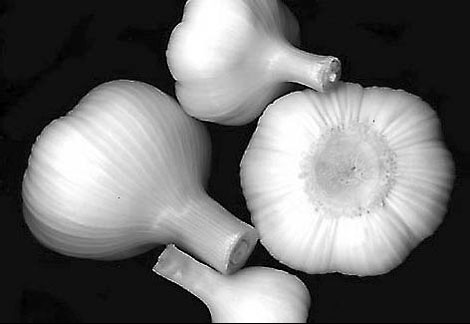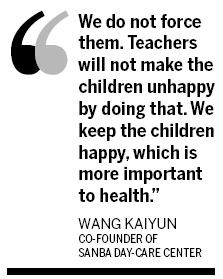Garlic kids
Updated: 2011-11-13 11:36
By Luo Wangshu (China Daily)
|
|||||||||

 |
|
In spring, fresh garlic bulbs (above) are pickled in vinegar, sugar and a little salt, turning into sweet pickled garlic (top). Provided to China Daily |
Childhood habits stay with us for life, and a nursery school in Nanjing thinks eating right should start young. Luo Wangshu has the story.
Sweet pickled garlic is a dining-table favorite in China. In spring, fresh young garlic bulbs are pickled whole in vinegar, sugar and a little salt. The garlic cloves are enjoyed as appetizers, or eaten with dumplings or jiaozi.
Young garlic bulbs are milder in flavor, and after pickling, their natural bite is neutralized. Instead, they become crisp and sweet. But would you feed them to young children?
That's what one day-care center in the eastern Chinese city of Nanjing has been doing for the last 60 years.
Sanba Daycare Center was established in 1948 in Nanjing, and staff members have been giving a clove of sweet pickled garlic to their young charges every day after breakfast since the start.
Wang Lan, who currently heads the nursery, says the center believes garlic is good for the children's health, and staunchly defends the tradition.
According to Wang, Sanba Daycare Center used to be a boarding school and it maintained a strict, healthy diet for the children to make sure they were all in good health.
"We have kept the tradition, even though we no longer take in boarders, because the children's good attendance record shows they are in good health," she says.

Not every child likes the smell or taste of garlic to begin with and the day-care center encourages them with theme activities such as making garlic dolls, and the planting of garlic bulbs and watching them grow.
"Once the children get familiar with garlic, they make friends with it and are more willing to take it as a regular supplement," Wang explains.
Only about half the children in the infant and toddler classes take garlic, but most of the kids in preschool classes, ranging from 4 to 6 years old, take part in the program.
This rather unusual tradition was started by one of the day care's founders, Wang Kaiyun, who was a graduate from Ginling College, which has teaching fellowships and exchanges with Wellesley College in the US. She studied home economics.
The current principal thinks Wang Kaiyun may have started the practice because of what she was taught in Ginling, but we will never know the actual reason, because she had already passed away.
Sanba Daycare Center has been in a whirl of controversy lately because of this garlic-feeding tradition, with many online opinions debating the merits.
But the center says teachers do not force-feed their charges.
"Garlic is not a medicine. We encourage our children to eat it but we do not force them. Teachers will not make the children unhappy by doing that," Wang says. "We keep the children happy, which is more important to health."
Chen Chunming, a nutrition expert, says a balanced diet is the key to good health, which is more than not feeding children a clove of garlic.
"Raw garlic doesn't have any significant anti-bacterial effect," says Xu Pengfei, the pediatrician at the Sino-Japanese Friendship Hospital in Beijing. "It tastes acrid, and can easily upset a child's stomach."
However, pickling the garlic makes the bulb sweeter and milder and better suited for a young palate.
Research from prominent institutions as the Loma Linda University Medical School in California have found that garlic can be effective and shows promise in treating some diseases. Already, garlic is a popular health supplement in both the West and in China, where the belief that food is medicine has prevailed for more than a thousand years.
You can contact the writer at luowangshu@chinadaily.com.cn.











